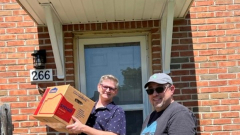Don’t give up on getting that house you really wanted

- Housing is slowly becoming more of a “buyer’s market.”
- Sellers’ asking prices are steadily decreasing despite remaining traditionally higher than usual.
- Don’t expect a big housing crash similar to 2008, experts say.
After nearly three months and looking at 24 different houses, Kevin Lowrie and Matthew Hambleton thought they found their forever home.
They discovered a quaint two-bedroom, one-and-a-half bathroom house in suburban Philadelphia. The couple, one a healthcare worker and the other an investment banker, made what they considered a high offer, only to be outbid by a popular all-cash deal some $70,000 higher than their offer.
“Bummed,” is what they said simultaneously to describe their reaction.
A month later, their realtor called with a second chance to bid on the house. The previous deal fell through. Did they still want it? They did.
The couple closed the deal on July 15 and on Saturday, they moved into their new home.
“We’re going to hang stuff up on the walls, we’re going to paint a wall,” Hambleton said. “We have a backyard!”
Lowrie added, “We can finally breathe.”
Their second chance to get their first choice for a home comes as U.S. homebuyers are backing out of purchases at the highest rate since the start of the COVID-19 pandemic, according to real estate broker Redfin.
But is it a slight correction in pricing or a recession-prompted trend? Depends, experts say.
Housing market downfall
About 60,000 home-purchase agreements fell through in June, Redfin said, totaling about 14.9% of homes under contract that month. That’s the highest percentage on record excluding March and April 2020 when the housing market came to a standstill due to the pandemic.
“I would say if you are a homebuyer, somebody, or a young person looking to buy a home, you need a bit of a reset,” said Fed Reserve Chair Jerome Powell last month about giving buyers a chance. “We need to get back to a place where supply and demand are back together and where inflation is down low again, and mortgage rates are low again.”
A homebuyer’s market?
Jessica Lautz, the National Association of Realtor’s vice president of demographics and behavioral insights, said the market is not balanced – yet – but some homebuyers now have a better chance of getting their preferred choice than a few months ago.
“Some higher-income home buyers may have a second bite at the buying apple due to less competition in the marketplace, but they would only have a better chance because other lower-income home buyers were pushed to the sidelines,” Lautz said.
She said local inventory, affordability, and the job market will play key factors in who benefits from the trend.
For example, in a NAR study released earlier this year, the cities of Deltona, Florida; Des Moines, Iowa; and the Augusta, Georgia-Richmond County, S.C. metro area are the top 3 U.S. locales where the most available and affordable homes for sale are relative to the household population with incomes ranging from $75,000-$100,000.
Lautz also cited a June NAR realtors confidence index report that said first-time home buyers represented 30% of all buyers nationwide, up from 27% in May, and another NAR report stating existing-home sales dropped for the fifth straight month in June.
Ryan McLaughlin, the CEO of the Northern Virginia Association of Realtors (NVAR) calls what he sees happening as the start of a “balanced market” that’s reminiscent of pre-pandemic times.
“It’s amazing because homes were selling 10- to 20 percent more about three months ago and that’s probably frustrating for a seller today who saw their neighbor get as much as $100,000 over their asking price,” McLaughlin said.
Is now a good time to sell?
While the seller’s market shows regional signs of cooling, that doesn’t mean housing prices are declining in every market. That June NAR report also said the median existing-home price for all types of housing was $416,000, that’s up 13.4% from June 2021 when the average home price was $366,900.
“Although the price to buy a house is higher, we’re seeing slightly less competition in the marketplace and that could bode well for homebuyers,” Lautz said.
For sellers, Ben Jasek, a realtor in Nashville, one of the hottest markets in the country, said patience is key.
“Homes are still going under contract, but versus offers within a day of being on market, it may take a week or two,” Jasek said. “Also, find ways to make your home stand out against the competition.”
How will mortgage rates affect home prices?
Homebuyers will have to contend with rising rates as a 30-year mortgage has had an average interest rate above 5% since mid-April and rate hikes from the Federal Reserve, which is likely to climb further after inflation came in at a whopping 9.1%, the largest increase in 40 years, according to the Bureau of Labor Statistics.
IT MAY GET WORSE: Mortgage rates just saw their biggest drop since 2008: Two reasons why that’s not good news.
STILL A LACK OF NEW HOMES: US homebuilder sentiment falls to its lowest level since the early days of pandemic
Kristina O’Donnell, a realtor in Collegeville, Pa., who helped Lowrie and Pemberton get their home, said the interest rate increases coupled with rising home prices prompted buyers to back out of deals.
On July 15, she said she helped a couple close on a townhome they were passed over for a month ago as the original buyers had “financial problems.” The couple plan to move in by Aug. 1.
She said some sellers’ asking prices are now decreasing almost daily.
“Instead of sellers having 30 appointments over a weekend, maybe it’s down to about a handful for some homes,” O’Donnell said. “It’s still competitive, but there are fewer offers for buyers to compete against.”
Higher rates may still not drive away the most determined homebuyers, said Jeff Taylor, a managing partner at Digital Risk LLC, a mortgage processor, and a board member of the nonprofit Mortgage Bankers Association (MBA).
“For the last two years, we all got into this mindset to spend almost every discretional dollar into our homes,” Taylor said. “It’s slowly changing as we’re gett





